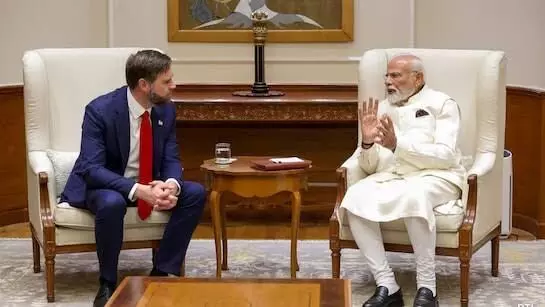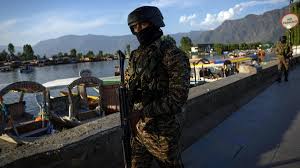In a comment that has set diplomatic and media circles abuzz, United States Vice-President J.D. Vance said the current tensions between India and Pakistan are “not our concern.” The comment, made at a press conference on American foreign policy priorities, has been both criticized and applauded depending on who’s reading it — indicating a possible change in Washington’s geopolitical stance.
This blog unpacks what Vance’s words mean, in what context they were made, and what This is promising for South Asia and international diplomacy.
The Context: India-Pakistan Tensions Flare Up
India-Pakistan tensions are not a recent phenomenon. Aggressive behavior between the two nations has existed since the British divided India in 1947. that is typified by several wars and disputes over Kashmir .Recent months have seen renewed border clashes, provocative rhetoric, and allegations of cross-border terrorism, reigniting concerns over a potential escalation of conflict.
International parties — the European Union, Union, and historically, the United States — usually displayed an active interest in diffusing the situation. It’s in this context that Vice-President J.D. Vance’s statement is accurate out.
Vance’s Statement: A Departure from Tradition
In a press briefing on U.S. strategic priority areas, Vance was asked if Washington would mediate or intervene in the growing tensions between India and Pakistan. His reply was unvarnished:
That is not our concern. We respect the sovereignty of both India and Pakistan and trust in their ability to address and resolve their bilateral issues independently. Our focus is on domestic matters and strategic partnerships that have direct bearing on American interests.

This stance runs counter to past governments that presented The United The characteristics of an global peace mediator, specifically in South Asia. In the past, both Republican and Democratic presidents and cabinet officials have mediated or employed backchannel diplomacy to prevent escalation.
Indian and Pakistani reactions
The response from both South Asian countries has been cautious but illuminating.

India seemed to take Vance’s words rather indifferently. New Delhi has been A persistent claim that The problem of Kashmir and related tensions are bilateral affairs and that any external disruption would not be accepted. Seen in this context, the U.S. This disengagement may occur at the same time when India asserts more strategic independence internationally.
But historically, Pakistan has sought international intervention in conflicts with India, especially in relation to Kashmir. Islamabad was disappointed, with a foreign office spokesperson saying, “Peace in South Asia benefits the global community. Nobody gains when prospective conflicts are ignored; doing so just causes the necessary settlement to be delayed.
What This Means for South Asia
India’s Strategic Autonomy Strengthened
India has consistently asserted its independence in international matters. Whether balancing between the U.S. and Russia or refusing to join Western sanctions, India’s diplomatic stance has been unambiguous. Vance’s words may be Considered an admission of India’s new proportions as a
world power that holds its own regional problems in hand.
Pakistan Can Switch to China or Russia
As the U.S. moves away from South Asia’s bilateral rivalries, Pakistan may become more turn to China and Russia for diplomatic or financial support. This would alter the balance of alliances and further polarize the location.
Risk of Miscalculation
Without a strong third party urging restraint, there’s always the risk that small Conflicts could get more intense. into full-scale conflicts. The lack of U.S. involvement takes away a layer of diplomatic pressure that has already served to defuse flashpoints.
A Wider U.S. Policy Shift?
Vance’s statement is consistent with a wider America First foreign policy strategy that emphasizes national interests and resists entanglement in regional conflicts except where directly linked to U.S. security or economic interests.

This is not quite novel — during the Trump era, too, there were such words spoken, and President Biden’s Afghan pullout reflected a decline in interest in foreign adventures. But the wholesale rejection of a possible nuclear showdown in South Asia is a grim reminder of how far that philosophy has traveled.
Critics and Supporters of the Statement
Critics argue that the U.S. cannot afford to disengage from hotspots like India-Pakistan, especially given both countries possess nuclear capabilities. They caution that withdrawal will encourage hardliners or result in unbridled escalation.
Supporters, on the other on the other hand, argue that the U.S.Should not take on the responsibility of acting as the global enforcer. They argue that regional powers need to be responsible for their own stability, and that continuous American intervention creates dependency and resentment.
Implications for Global Diplomacy
Signals a Multipolar World Order
The statement emphasizes the growing trend in the direction of a multipolar world in which regional powers like India, China, Turkey, and Brazil are to resolve their regional conflicts without relying on Washington.
Redefining U.S. Leadership
Instead of being the world’s problem-solver, the U.S. might increasingly act as a selective player in global affairs — intervening only when national interests are involved.
Testing Regional Institutions
There is no strong regional security architecture like the EU or NATO in South Asia. SAARC or the creation of new alliances or the adaptation of Other Companies may turn into a result from this change.
